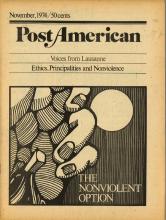Watergate has pointed out the need for reform of campaign financing, for a check on executive power, for closer congressional oversight of the IRS, FBI, and CIA, for a reassertion and renewed vigilance of our constitutional liberties. But Watergate also has illustrated the depravity of all men and women, whatever their political philosophy. Hubert Humphrey, too, took milk money, and Ted Kennedy has left Chappaquiddick questions unanswered for years. Charles Colson became a Christian during—but not because of—Watergate; but that didn’t stop him from exhausting almost every imaginable legal avenue to avoid prosecution for his wrongdoing. Young adults at Evangelical Fourth Presbyterian Church in suburban
If Watergate has pointed out the need for repentance among our national leaders, it also has exposed the stark inequality in our nation’s administration of justice.
Read the Full Article

